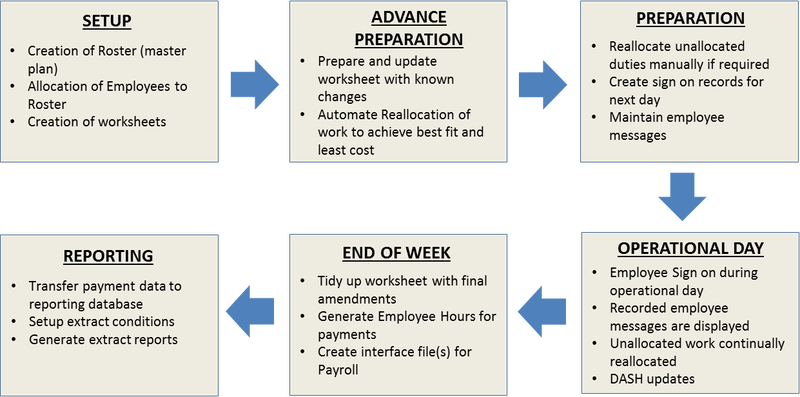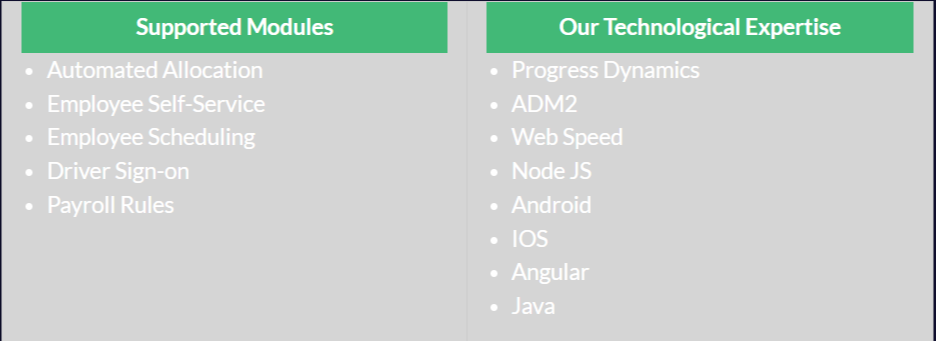The Client
The Group is a 25-year-old organization that works with public transit agencies and their communities to develop and deliver solutions for smarter and effective public transit. The UK subsidiary of the Group provides transportation solutions for fixed route, rail and paratransit transportation.
The Challenges
Managing workforce and operations become difficult when it comes to managing thousands of employees, including drivers, mechanics and field staff. Daily tasks and duties need to be assigned in accordance with union rules and road traffic laws and regulations. Moreover, vacation requests, sick leaves, unexpected shifts, conflict management and any other last-minute changes need to be addressed while supervising the staff.
In addition, DAS solution demanded to be abreast with the changing business environment and commanded growth both functionally as well as on the technical front. It was essential that the solution supported a real-time dashboard for the management and senior stakeholders in the organization for quick decisioning, ensuring:
- Reduced human errors and high scheduling efficiency.
- Improved Public Service.
- Real-time updates.
- Integration of time-keeping and payroll.
- Daily processes’ automation to assign drivers with respective buses.
- Managing the organizations’ employees.
The Objective
Duty Management and Driver Allocation Software (DAS) is the driver and duty management tool, designed to minimize staff costs, overtime payments, reduce allocation wastage and ensure compliance with the “Road Traffic Act” when allocating work to drivers. The software reduces costs, makes the most of available staff and solves the challenges faced by the public transport industry.
The client was seeking support for its DAS software, a product that they added to their portfolio post-acquisition of a leading provider of employee management systems to the UK transport industry. The product specifically tailored for public transport witnessed a user-base of around 40,000 staff of more than 30,000 buses carrying 12 million passengers every day. In addition, it was desired the solution ensures timely departure of a bus from depot to improve the quality and reliability of the service to the public while avoiding government penalties.
The Solution
A typical day in the life of a fleet manager includes maintaining compliance with company policies and procedures, ensuring adherence to applicable laws and regulations, record-keeping, staff management, scheduling, routing, maintaining, and tracking transport vehicles, supplier management and resolving disputes. It is vital to analyze the effectiveness of operations and implementing and enforcing transportation scheduling and policy changes for seamless transport service to the public.
We have been associated with the client for developing Duty Management and Driver Allocation System – a self-service portal for fleet managers, drivers, mechanics, field staff, yard personnel, and dispatchers. The 13-year engagement has been focused to offer a competitive product for leading transport companies in the UK, making passengers’ lives easier.
The solution developed on Progress Software version 9.1 focuses on providing the client’s end customers with a platform for seamless operations management; to manage public transit operations including scheduling of hundreds of employees, frequent sign-ups, complex pay rules and agreements, last-minute absences, mechanical problems and other challenges.
JK Tech skilled resources ensured end-to-end application development and integration with scheduling, payroll, HR systems, maintenance systems, etc. In addition, the platform supported handling updates in real-time, automating time-consuming labor-intensive tasks including sign-ups, driver check-in/check-out, etc., which resulted in improved response time to unexpected events. Proper step-by-step workflow management was maintained to streamline and speed up the internal process with reduced errors and minimal re-work.
Duty Allocation System Product Workflow:


We also facilitated quality development and deliveries by managing incidents and change requests effectively. Our zero-defect deployment ensured the speedy implementation of new functionalities and improved performance of modules such as automated allocation, employee self-service, employee scheduling, driver sign-on, payroll, cost adjustment & reconciliation and appointment and process management significantly. In addition, the creation and updating of the centralized knowledge base supported easy onboarding.
The Benefits
- Optimized Resources & Control Costs – Efficiently managing employees, assigning assets, analyzing the cost-effectiveness of employees. The changes made by the team in the application reduced the runtime of the loader from 510 min to just 24 min, making it 95% more efficient.
- Deliver Value Through IT Investments – Application development of Progress version 9.1 seamlessly integrating different modules – HR systems, Payroll, Scheduling, etc. supported with analytics and reporting resulted in accurate data inputs to showcase reports in near real-time.
- Enhanced Customer Experience – Single sign-on for the operator and employee showcases their respective views and related data to plan their day better followed by transparency in the availability and allocation of work i.e. fleet managers had a clear picture of drivers’ working hours and drivers could get clear visibility of available work, ensuring fair distribution of holidays and overtime for them; ensuring smooth public service.
- Better Information for Better Decision Making – Real-time dashboard reporting enabled the clients’ customers to monitor and measure performance and metrics in real-time. The end-customers could visualize and analyze data on 15 parameters including rostered duty hours, basic hours, rostered non-driving hours, overtime, unsocial hours training, absence maternity/paternity, staff borrowed in/out, etc., and focus on Key Performance Indicators (KPIs) across the organization on a dashboard, helping them gain valuable insights and drive quick and accurate decisions.
Happy Customer
The Client – Technical Director
“Very Good mixing with the team, productivity was high, and communication was very good.”



